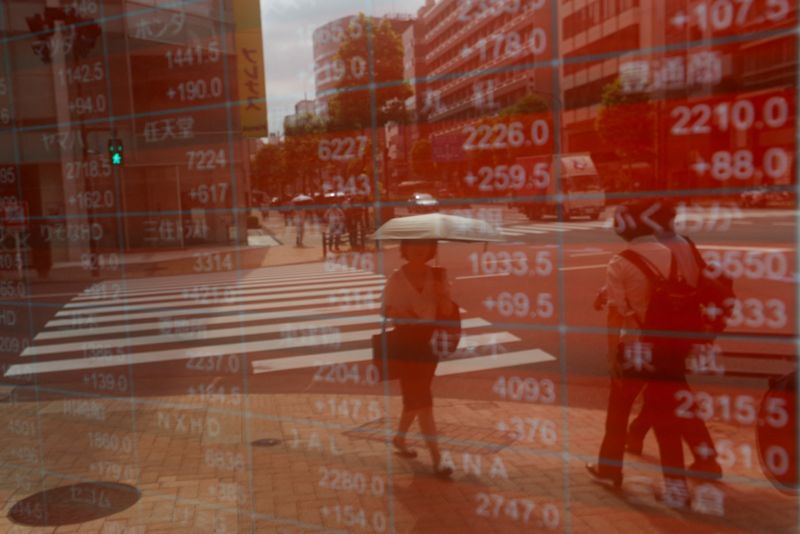Europe, US stock futures climb while Nikkei slides as US inflation data awaited
By Tom Westbrook
SINGAPORE (Reuters) - European and U.S. futures pointed to a modest bounce on Tuesday, though spiking bond yields and a strong dollar have investors wary of taking too many risks ahead of U.S. inflation data and the start of Donald Trump's second term as U.S. President.
Nasdaq 100 futures rose 0.5% in the Asia session after the index dropped in New York cash trade on Monday. S&P 500 futures were 0.3% firmer.
European futures were up 0.8% and FTSE futures were broadly steady.
But in Asia, Japan's Nikkei slumped 1.8% and touched a six-week low as investors shed chip stocks and fretted about a possible Bank of Japan interest rate hike.
Bank of Japan Deputy Governor Ryozo Himino, in a speech to Japanese business leaders, left the door open to a rate hike at the conclusion of the next policy meeting on Jan. 24 .
Chipmaker stocks have been under pressure following new U.S. restrictions on exports. The exception has been in China where local manufacturers rallied in anticipation of a boost to their domestic market share and speculation of state help.
The Shanghai Composite , up 2.5%, notched its best day since Nov. 7 and Hong Kong tech shares rose more than 3%. (HK )
Elsewhere, rates have been front of mind for investors since an unambiguously strong U.S. payrolls report sent up yields and decreased the odds of Federal Reserve interest rate cuts.
All eyes are on U.S. inflation data due on Wednesday. Any rise in the core figure greater than the forecast 0.2% would threaten to close the door on easing altogether.
"It'll be touch and go for the next couple of days until we get the inflation news out of the way," said Peter Cardillo, chief market economist at Spartan Capital Securities in New York.
"The Fed has become more hawkish at this time," and investors are considering the possibility that the U.S. may have seen the end of rate cuts for now, he said.
Benchmark 10-year yields steadied at 4.76% after hitting 4.805% in New York trade, the highest since early November 2023. Markets are pricing just 29 basis points of cuts from the Fed this year.
CRUDE AWAKENING
Not helping sentiment has been a spike in oil prices to four-month highs amid signs of weaker shipments from Russia as Washington stepped up sanctions and trepidation about the effect of Trump tax, immigration and trade policies on inflation.
Benchmark Brent futures have shot though their 200-day moving average and stayed above $80 at $80.52 a barrel on Tuesday. [O/R]
Unusually, the unease in traditional financial markets has spread to cryptocurrencies, and bitcoin, at just below $95,000, is down almost 7% over the past seven days.
In foreign exchange, the euro was steady at $1.0249, hovering near the more than two-year low of $1.0177 it touched on Monday. The yen was at 157.59 per dollar, inching away from the near six-month low it touched last week.
The battered Australian and New Zealand dollars took a breather and notched small rises. [AUD/]
The dollar index , which measures the greenback against a basket of currencies, hit its highest in more than two years at 110.17 overnight and was last at 109.57. [FRX/]
The fourth-quarter U.S. earnings reporting season also gets under way on Wednesday, with results expected from some of the biggest U.S. banks including Citi and JPMorgan Chase (NYSE:JPM ).
"The question investors are grappling with is what's more important - strong corporate earnings, which come from a strong economy, or lower inflation, which comes from a weaker economy," said Oliver Pursche, senior vice president, adviser for Wealthspire Advisors in Westport, Connecticut.
"Most investors would prefer a strong economy with slightly elevated inflation," he said.
Source: Investing.com
